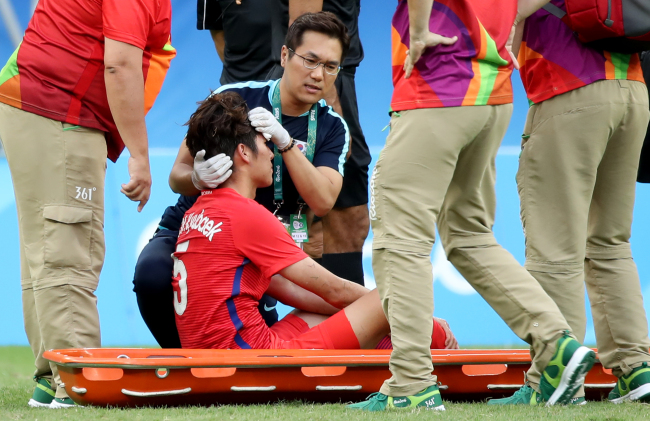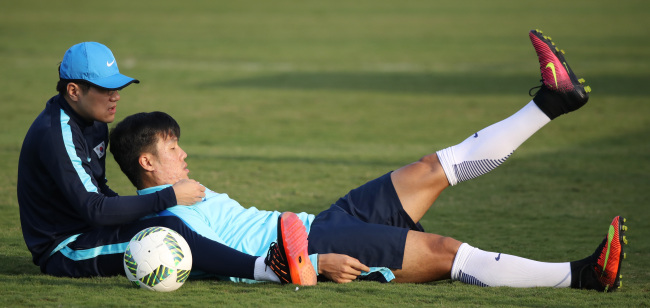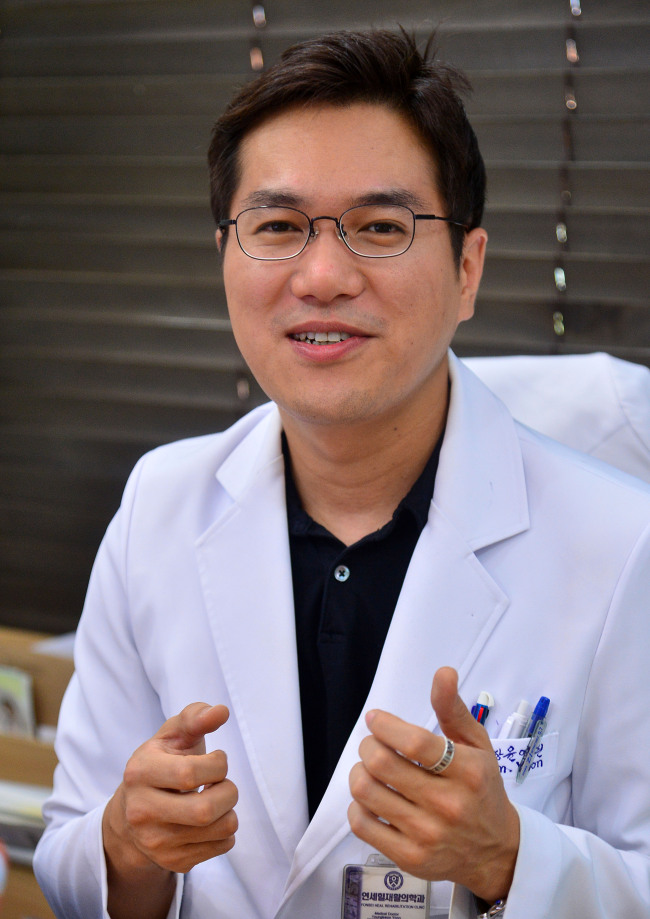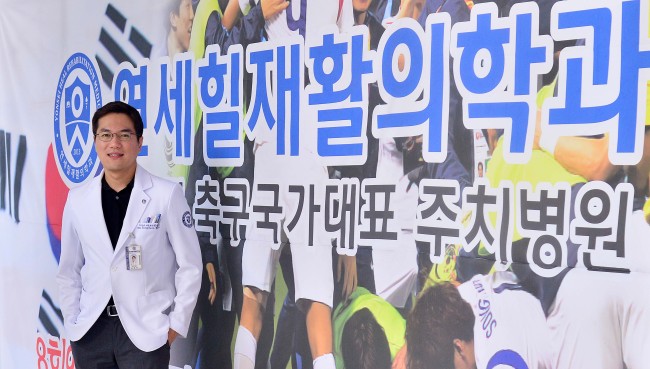[EYE] Team doctor: critical force of football
Rehabilitation specialist recalls memorable moments of S. Korean football team’s stay in Rio
By Korea HeraldPublished : Aug. 26, 2016 - 14:15
Winning is on most people’s minds when adrenaline-pumped soccer players compete for a medal in the Olympics, be it the athletes, the coaching staff or the spectators.
But the mind of Yoon Young-kwon, watching the game right beside head coach Shin Tae-yong on the bench, was focused on helping the players avoid injury and applying quick treatment during the game.
But the mind of Yoon Young-kwon, watching the game right beside head coach Shin Tae-yong on the bench, was focused on helping the players avoid injury and applying quick treatment during the game.

“The most frustrating moment in the Rio Olympics, for me, was when (center back) Choi Kyu-baek had a laceration on his forehead about 5 centimeters long after clashing heads with a German player,” recalled Yoon, the team doctor of South Korean men’s football team for the 2016 Rio de Janeiro Olympics.
“At first, his bleeding was severe. I immediately applied five stiches in the stadium’s medical room. As the second half proceeded, the local medical staff gave him another six stiches.”
South Korea ended that game against Germany with a 3-3 draw, a surprisingly good result. The team’s morale went even higher after it defeated Mexico 1-0. But the following match against Honduras ended their unbeaten streak and dreams of an Olympic medal.
Although the South Korean men’s soccer team came home empty-handed, they set a new home record.
“At first, his bleeding was severe. I immediately applied five stiches in the stadium’s medical room. As the second half proceeded, the local medical staff gave him another six stiches.”
South Korea ended that game against Germany with a 3-3 draw, a surprisingly good result. The team’s morale went even higher after it defeated Mexico 1-0. But the following match against Honduras ended their unbeaten streak and dreams of an Olympic medal.
Although the South Korean men’s soccer team came home empty-handed, they set a new home record.

Under head coach Shin Tae-yong, the squad reached the quarter-finals with two wins and a draw in Group C -- their best performance ever at the Olympic Games.
“Nobody on the bench -- the coaching staff, the players and me – had thought that South Korea could lose the game (against Honduras). It was as though the whole South Korean team was haunted by some spirit on that day,” Yoon said at his Yonsei Heal Rehab Clinic in Jamsil, southern Seoul.
Prior to the disappointing match, Tottenham Hotspur attacker Son Heung-min’s desire to get a medal at Rio was stronger than ever, Yoon recollected.
“I remember him demanding 10 times stronger extracorporeal shockwaves on his legs to quickly restore fatigue in tendons and muscles during evening therapy sessions. Heung-min seemed like he really wanting to win,” he said.
“Nobody on the bench -- the coaching staff, the players and me – had thought that South Korea could lose the game (against Honduras). It was as though the whole South Korean team was haunted by some spirit on that day,” Yoon said at his Yonsei Heal Rehab Clinic in Jamsil, southern Seoul.
Prior to the disappointing match, Tottenham Hotspur attacker Son Heung-min’s desire to get a medal at Rio was stronger than ever, Yoon recollected.
“I remember him demanding 10 times stronger extracorporeal shockwaves on his legs to quickly restore fatigue in tendons and muscles during evening therapy sessions. Heung-min seemed like he really wanting to win,” he said.

Players are exposed to different types of injuries depending on what position they play, Yoon noted. Goalkeepers tend to have bad shoulders due to the repeated long throws of the ball. They also pick up frequent finger injuries while blocking the ball or scraping their fingers on the ground.
Defenders are vulnerable to head injuries and concussions due to challenges in the air, while strikers can suffer leg injuries when sprinting. Midfielders are easily exposed to ankle and knee injuries, as they have to be both speedy and travel long distances in a match.
The 37-year-old rehab specialist deepened his expertise in sports injuries after he became the Olympic team doctor in July 2015. Some footballers had visited Yoon’s clinic for treatment and recommended him to head Shin as the team doctor.
Before opening his clinic in November 2014, he worked as a resident at Severance Hospital’s rehabilitation medicine.
Prior to departure for Rio, Yoon was desperate to prevent any weakening of the players’ immune system in Brazil, where worries over the Zika virus were prevalent.
“Because there’s no vaccine for Zika, all we could do was get four other vaccines -- influenza, yellow fever, hepatitis A and cholera -- in one day at Ilsan Paik Hospital.”
To prevent any mosquito bites, Yoon packed a 40-kilogram bag of mosquito repellent sprays, bracelets and electronic incense diffusers.
In total, the medical equipment for the players -- including extracorporeal shockwaves, laser physical therapy devices, leg sleeves that help blood circulation, fluids and nutrients -- totaled 3 tons of cargo, he said.
Yoon stressed the importance of rehabilitation medicine in dealing with footballers’ injuries.
Defenders are vulnerable to head injuries and concussions due to challenges in the air, while strikers can suffer leg injuries when sprinting. Midfielders are easily exposed to ankle and knee injuries, as they have to be both speedy and travel long distances in a match.
The 37-year-old rehab specialist deepened his expertise in sports injuries after he became the Olympic team doctor in July 2015. Some footballers had visited Yoon’s clinic for treatment and recommended him to head Shin as the team doctor.
Before opening his clinic in November 2014, he worked as a resident at Severance Hospital’s rehabilitation medicine.
Prior to departure for Rio, Yoon was desperate to prevent any weakening of the players’ immune system in Brazil, where worries over the Zika virus were prevalent.
“Because there’s no vaccine for Zika, all we could do was get four other vaccines -- influenza, yellow fever, hepatitis A and cholera -- in one day at Ilsan Paik Hospital.”
To prevent any mosquito bites, Yoon packed a 40-kilogram bag of mosquito repellent sprays, bracelets and electronic incense diffusers.
In total, the medical equipment for the players -- including extracorporeal shockwaves, laser physical therapy devices, leg sleeves that help blood circulation, fluids and nutrients -- totaled 3 tons of cargo, he said.
Yoon stressed the importance of rehabilitation medicine in dealing with footballers’ injuries.

“Rehabilitation medicine is more relevant than orthopedics when it comes to football because orthopedics are mostly for surgeries, which is rare on the ground,” said the doctor.
“I find it quite meaningful to apply rehabilitation medicine to take care of chronic problems of the players.”
Although Yoon is not sure if he will also join the A team for 2018 FIFA World Cup in Russia, he shared the strengths and weaknesses of the South Korean players who were included in the recently unveiled 21-man squad.
The senior team squad under head coach Uli Stielike includes Salzburg forward Hwang Hee-chan, attacker Son Heung-min, Trabzonspor striker Suk Hyun-jun, Guangzhou R&F defender Jang Hyun-soo and Suwon Bluewings midfielder Kwon Chang-hoon.
In the final qualification round South will plat China in Seoul on Sept. 1 and head to Macau to take on Syria.
“(Suk) Hyun-jun, who will be playing only for the match against Syria, is quite vulnerable to hysterical situations. (Hwang) Hee-chan boasts enormous amount of thigh muscles, which is a double-edged sword for muscle damage,” Yoon said.
“(Son) Heung-min, in his nature, hardly gets injured or sick.”
“I find it quite meaningful to apply rehabilitation medicine to take care of chronic problems of the players.”
Although Yoon is not sure if he will also join the A team for 2018 FIFA World Cup in Russia, he shared the strengths and weaknesses of the South Korean players who were included in the recently unveiled 21-man squad.
The senior team squad under head coach Uli Stielike includes Salzburg forward Hwang Hee-chan, attacker Son Heung-min, Trabzonspor striker Suk Hyun-jun, Guangzhou R&F defender Jang Hyun-soo and Suwon Bluewings midfielder Kwon Chang-hoon.
In the final qualification round South will plat China in Seoul on Sept. 1 and head to Macau to take on Syria.
“(Suk) Hyun-jun, who will be playing only for the match against Syria, is quite vulnerable to hysterical situations. (Hwang) Hee-chan boasts enormous amount of thigh muscles, which is a double-edged sword for muscle damage,” Yoon said.
“(Son) Heung-min, in his nature, hardly gets injured or sick.”

By Kim Yoon-mi (yoonmi@heraldcorp.com)
-
Articles by Korea Herald








![[Graphic News] More Koreans say they plan long-distance trips this year](http://res.heraldm.com/phpwas/restmb_idxmake.php?idx=644&simg=/content/image/2024/04/17/20240417050828_0.gif&u=)
![[KH Explains] Hyundai's full hybrid edge to pay off amid slow transition to pure EVs](http://res.heraldm.com/phpwas/restmb_idxmake.php?idx=644&simg=/content/image/2024/04/18/20240418050645_0.jpg&u=20240419100350)






![[From the Scene] Monks, Buddhists hail return of remains of Buddhas](http://res.heraldm.com/phpwas/restmb_idxmake.php?idx=652&simg=/content/image/2024/04/19/20240419050617_0.jpg&u=20240419175937)

![[KH Explains] Hyundai's full hybrid edge to pay off amid slow transition to pure EVs](http://res.heraldm.com/phpwas/restmb_idxmake.php?idx=652&simg=/content/image/2024/04/18/20240418050645_0.jpg&u=20240419100350)

![[Today’s K-pop] Illit drops debut single remix](http://res.heraldm.com/phpwas/restmb_idxmake.php?idx=642&simg=/content/image/2024/04/19/20240419050612_0.jpg&u=)